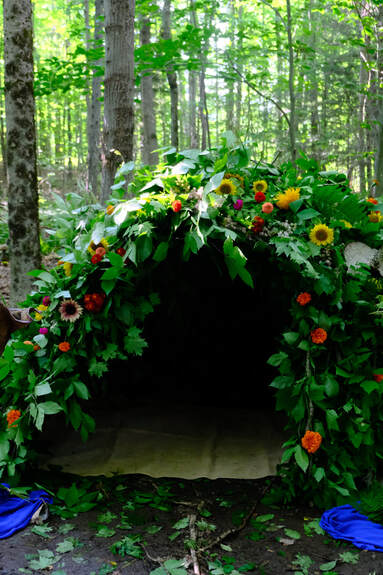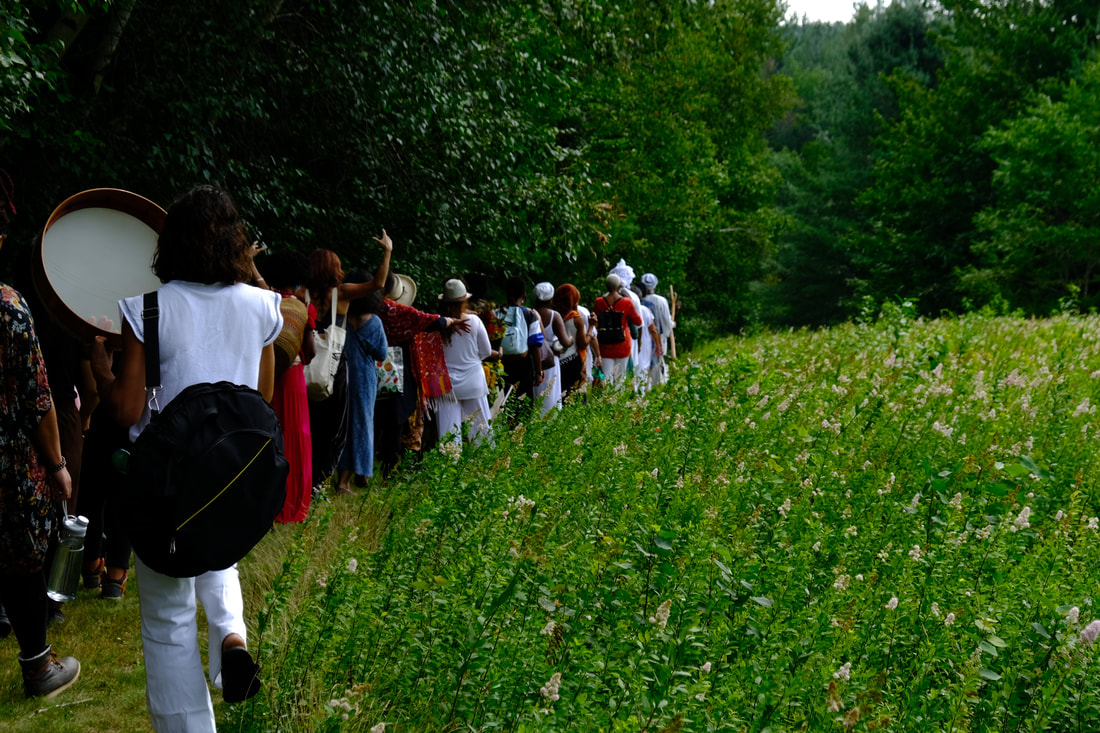
Knees down on the earth, my face and hands covered with tears, snot and dirt, under the canopy of trees, I am looking into a womb of green leaves and flowers made by our own communal hands, guarded on either side by two elder Black women, their faces covered in white ash. I hear the primal wailing of women to my left and right, and the joyous singing of women behind me, drums going steady in the background. I am grieving for all that I have lost in the past year, knowing this would be one of the few times when it would be OK for me to let it all go and not “hold it all together”. In that moment, I just couldn’t anymore. As I open my eyes and look to my left and my right, I see one of my apprentices on either side of me, face down on the earth. This after giving them an impossible instruction to “watch and not participate”. So much for that… They too needed this. In this humbling moment there is no hierarchy among us – we are all daughters of the Earth, come to pay our grievances, come from long lineages of people who had been betrayed, forgotten, but who still live in us. We call to them at the grief shrine with voices and tears choked since girlhood – calling for return to our truer state of being, calling for an end to suffering; no words are needed. The women around me come and go as their grief waxes and wanes. We witness each other in this raw state. There is nothing to hide. And no questions asked. Then at some point, having found the natural end to my grief that had moments before felt so all-consuming, I walked back to the “the village” behind me to be welcomed in a way I had never been before in my life. I was received by the village I had dreamed of for 3 years, and had sacrificed so much for. I entered in as the orphan I was – to the arms of dozens of women proclaiming: “Welcome Home! Welcome Home!”
This is the memory I will always have of Malidoma's legacy. A homecoming for all of us who dared to expose ourselves that day…to the tears, the laughter, the earth, the water, the fire, the stones, the flowers and the forest. As per the traditional ways, we created every aspect of the ritual from start to close in our elemental clans. What needed to rupture, was ruptured. What needed to be soothed, was soothed. This experience would set the tone collectively for Rites of Passage: 20/20 Vision, and for the deep felt sense of vulnerability, belonging, love and communitas that was the plasma that unified us through those intense initiatory days. This, is how we became a village.
I first encountered Malidoma’s work 9 years ago when I read his book “Of Water and the Spirit”. In it, he wrote that until our difficult life experiences could be “ritually seen & heard”, they would “remain dimmed as traumas to cope with, instead of as powerful initiations.” This is why and how I became passionate about creating Rites of Passage as a space for initiation that we as modern, displaced, colonized people no longer had or could even imagine. Moreover, in reading his life story, I witnessed my own difficult journey back & forth between the West and my estranged homeland. Like Malidoma, I too was an orphan in my own peculiar way. Like him, I suffered not only the ravages of colonization, but also that of Christianity – resulting in the collective forgetting and condemnation of our ancestral shamanic ways. And, I too had returned home for a kind of Soul-vision quest to uncover those shamanic origins. Unlike him however, I never had a tribe to welcome me back, elders and loved ones who knew what I was here for. Yet, like him, I too returned to the West to be a bridge, and would never fully belong to any place, being always a nomad who exists in the in-between.
I never met Malidoma in person, and yet his work has inspired so much of my life and creations. While he knew about the ROP project, we never connected directly. I find that strange now, and regret that I didn’t try to reach out to him. I always figured he was too busy, and it was not yet the time, even though in the last year I had become aware that the time was closing in. Perhaps somehow, we were connected by the unseen threads of ritual, and by shared friends.
From that initial encounter with his work, it would be years until I experienced a Dagara Grief Ritual myself. My first one was led by Katja Esser at the Daughters of the Earth gathering held by ALisa Starkweather, and my last by elders Laura Gibbons-Bowman & Lula Christopher as the opening initiation into Rites of Passage: 20/20 Vision this past August. When the directive for 20/20 Vision emerged 4 years ago, I knew that we needed to begin our intensive process with a full-day Dagara Grief Ritual. But it was several years from that knowing until I was connected by my friend and Rites of Passage 2013 collaborator Cindy Parrish, (also co-founder of East Coast Village, a center for Malidoma’s work), with the now-beloved elders who held space for us to grieve together in the forest at Starseed Sanctuary. A Grief Ritual of Women of Color, for Women of Color – in recognition of all the lines that have been colonized in the past 500 years – a return to our knowing, a coming Home to the Earth.
From reading about Malidoma’s native Dagara village 9 years ago, to experiencing “the village” in form – if only for a brief time, in my own small way, I’ve traveled a full circle. From the emergence of Rites of Passage, to the flowering of this past summer’s 20/20 Vision, in honoring origins, I am deeply grateful to Malidoma Somé for sharing seeds that would be planted and then harvested in that garden of shared remembrance.
A much larger circle now closes as this great soul leaves the world of the living and crosses the far shore to become an ancestor. Perhaps if we are lucky, we will have him back as one of the new brave ones who will help guide us onward into the next Passage. It is up to all of us who have been blessed by his transmission – directly and indirectly – to continue the work of honoring grief & praising life in our own unique ways, and to keep the village alive with gratitude and a full heart. Blessings to you Elder Malidoma.
Thank you to Nicole Combeau for the photos.

 RSS Feed
RSS Feed